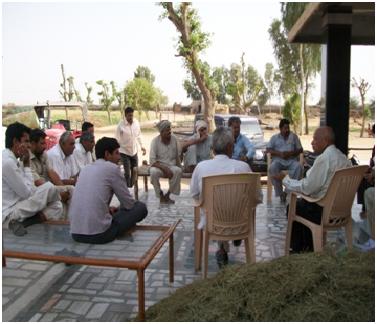NYVAS
Nav Yug Vikas & Anusandhan Sansthan
Call Us: +91 151 2204247
Farm School
2013-14:Farmer field schools are traditionally an adult education approach—a method to assist farmers to learn in an informal setting within their own environment. FFSs are ―schools without walls'' where groups of farmers meet weekly with facilitators. A farm field school (FFS) consists of 25-30 farmers who meet one morning every week for an entire crop growing season. A FFS is facilitated by extension workers or skilled farmers. Employing non-formal education methods, the field is used as the primary resource for discovery-based learning.
The process is facilitative and respects the experience that farmers bring with them. Farmers work in small groups to ensure that each one's ideas are shared. In the FFS there is acceptance of the uniqueness of each participant. The activities are designed to respond to the immediate needs of farmers and are general towards encouraging creativity and independence.
Navyug Vikas & Anusandhan Sansthan's trainer played a crucial role of facilitator in ensuring that the environment and all resources contribute to the farmer's learning experience.
The following places where farmer's field schools were running in 2013-14:
- 1. Khajuwala Farm Field School
- 2. Nokha Farm Field School
- 3. Kolayat Farm Field School
The total no. of beneficiaries who were benefitted from the farm field schools were 90 farmers. All these farmers later on helped other farmers in their respective area to adopt the best practices of farming to increase the productivity.
Previous Years:Yet another precious feather in NYVAS cap was getting a chance to run 4 farm schools two each at Bikaner and Kolayat village, for wheat crop. School was organized at the field of following locations:
- 1. 20 jmd, Badrasar(BKN)
- 2. Gigasar(BKN)
- 3. Badnu(Nokha)
- 4. Pitasar(Nokha)
At School farmers scientist and NYVAS staff (at all critical phases) meet about 7 times, right on the farmer field.
Generally there are 6 critical stages in wheat, but due to drastic condition at western Rajasthan about 7-9 stages are seems to be critical they are:
- 1. Seedling Emergence
- 2. Beginning of tillering
- 3. Tillers formed
- 4. Beginning of erect growth
- 5. Leaf sheaths strongly erect
- 6. First node visible
- 7. Flag leaf visible
- 8. Beginning flowering
- 9. Wheat mature and harvest

Basically we adopted 4 methodologies for farm school to solve the on farm problems:
- (1) R & D
- (2) Learning for Motivation
- (3) Group Discussion
Outcome of project:
- 1. 25% reduction in net water used
- 2. 10-15% increase in crop production
- 3. Better understanding of crop and its environment
- 4. Leaders among small and marginal farmers were recognized at each location they are:
- a. Sh Madan Lal Nayak 20 JMD BADRASAR (BKN)
- b. Sh Surja Ram Nain, GIGASAR (BKN)
- c. Sh Kana Ram, BADNU (NOKHA)
- d. Sh Rajendra Kumar, PITASAR (NOKHA)
| FARM SCHOOL VISIT SCHEDULE Late Dr. S K MATHUR Dr.Pradeep Choudhary Sh. Lalit Charan Sh. Rajesh Sharma |
|
|---|---|
 |
Seedling Emergence |
 |
Tillers formed |
 |
Leaf sheaths strongly erect |
 |
First node visible |
 |
Flag leaf visible |
 |
Boot stage |
 |
Wheat mature |